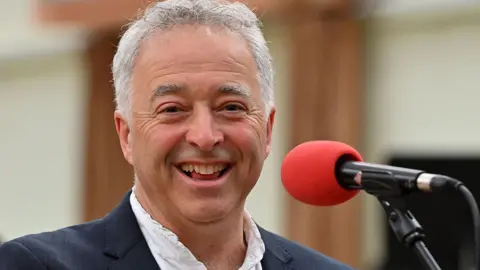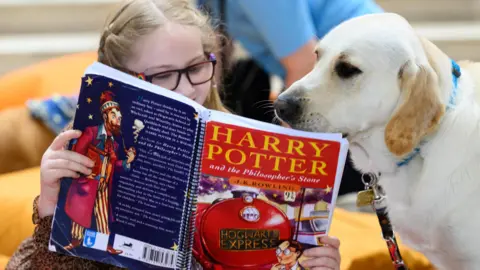 BBC
BBCLibraries must be protected as places of learning and reading and as spaces “where we bump into each other and make acquaintance and see each other”, Children’s Laureate Frank Cottrell-Boyce has said.
An investigation by the BBC has found local councils have stopped running more than 180 libraries nationally, with many now kept open by volunteers and almost 1,000 seeing opening hours reduced in the last seven years.
On Merseyside, where Cottrell-Boyce grew up, five libraries in St Helens and eight libraries in Wirral have closed.
He said it was important to save them as they were “not just about books” but were also places of “human contact”.
The author and screenwriter, who was named as the new children’s laureate in July, told BBC Radio Merseyside libraries had been an essential part of his formative years, while growing up in a small flat in Kirkdale, Liverpool, with his mother and grandmother.
He said his mum would take him to the library as a way to “get out of a tense, cramped situation” but his experience of “that hardship of hers was just completely joyous”.
“We sat in that library and she read us stories and it was gorgeous and she felt safe and it was just lovely,” he said.
 PA Media
PA MediaHe said libraries were “not just about books”, but also about “space”.
“It’s about public spaces where you go to learn to behave, where you learn to show respect to other people, to listen, and to learn that you are important because this is for you,” he said.
“We need spaces where we bump into each other and make acquaintance and see each other.
“Computers and screens are wonderful and they do fantastic things for us, but they isolate us and they isolate our children.
“The library is somewhere where you can go with your kids, and the kids can see other kids.
“That human contact is so important.”
A government representative said public libraries played an “important role” in communities by providing access to books, work and learning.
“We recognise the pressures they face,” they added.
“[We] are committed to giving stability back to local councils, so services such as these can best meet the needs of their communities.”





